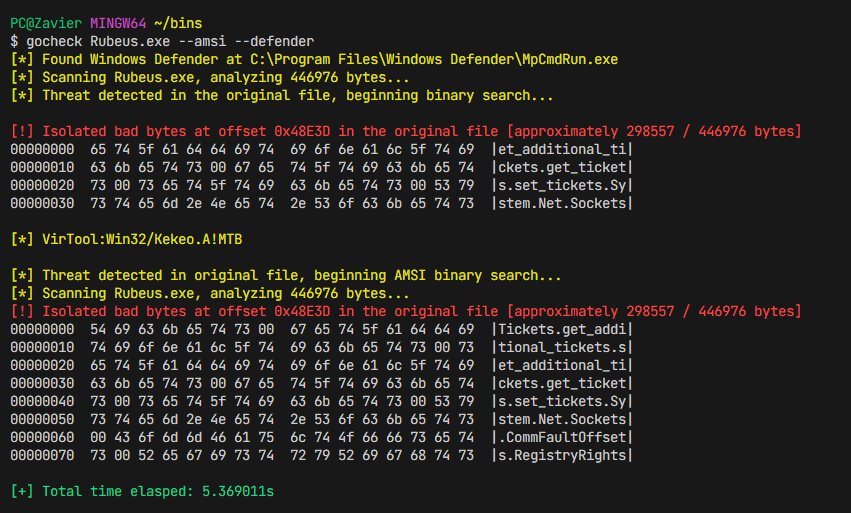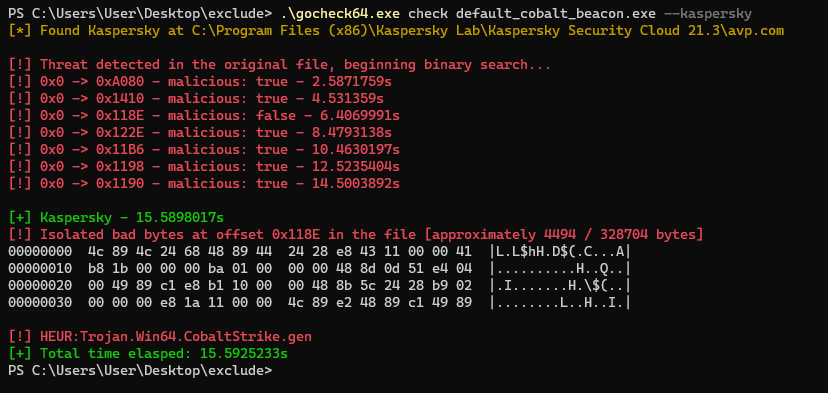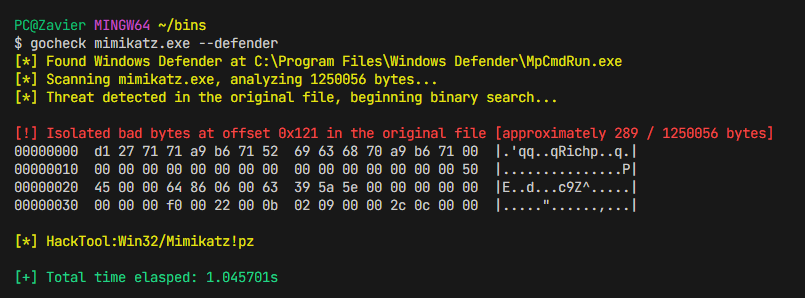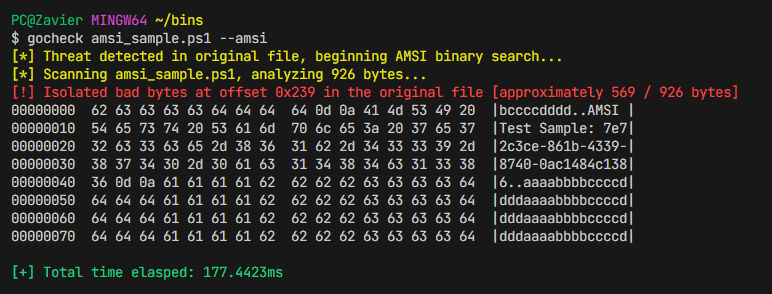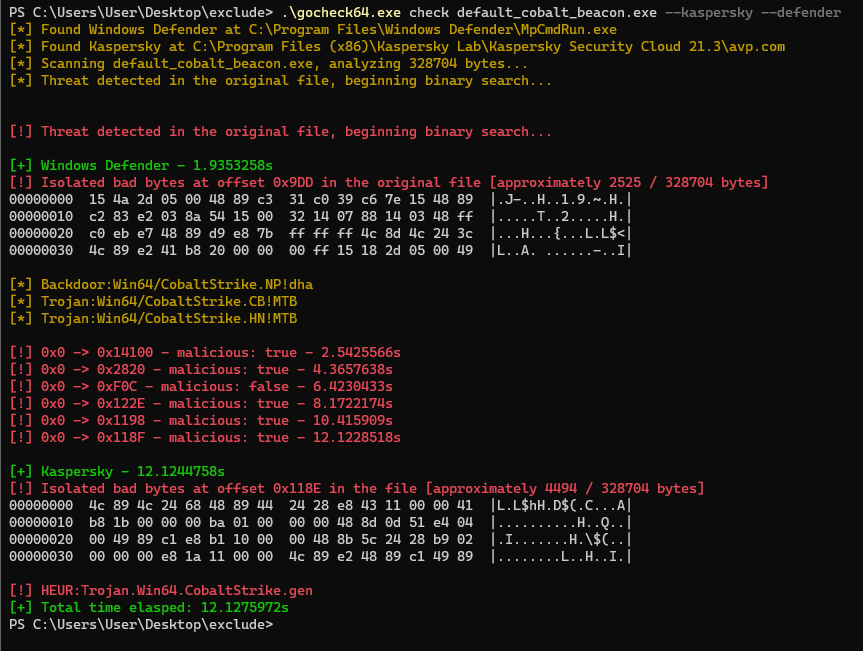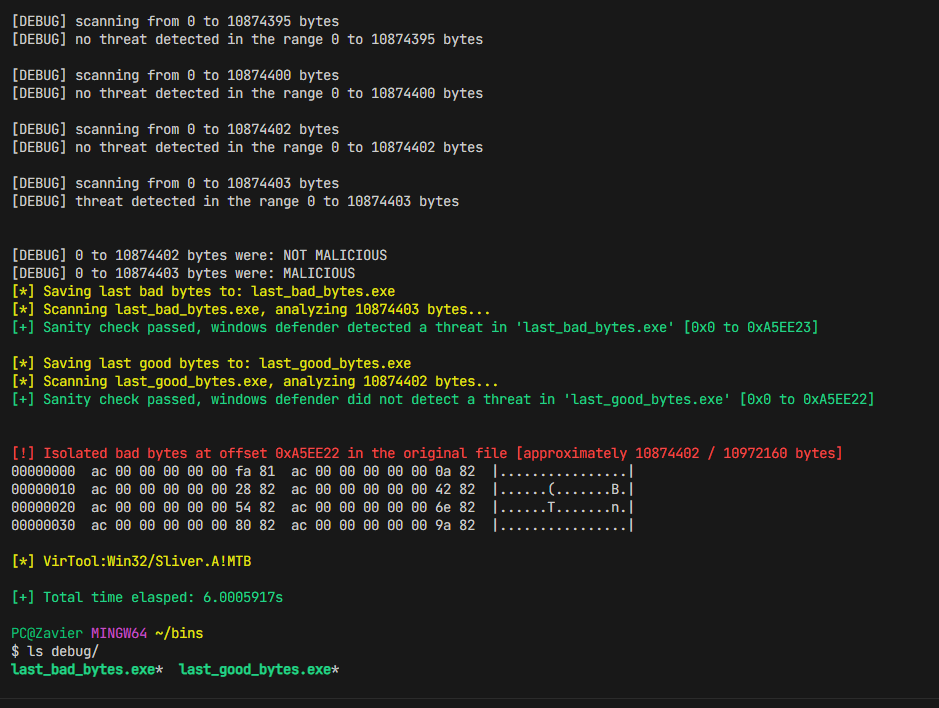gocheck is a golang implementation of Matterpreter's DefenderCheck that aims to aid red teams in their malware development capabilities by identifying the exact bytes in their malware that are flagged by security solutions (incomplete integration with enterprise AV, see External Scanners)
I also wrote a blog post showcasing this project: Identifying Malicious Bytes in Malware
You can install gocheck from go install
go install github.com/gatariee/gocheck@latestAlternatively, you can download the precompiled binaries from the releases or build it yourself.
git clone https://github.com/gatariee/gocheck
make [ windows / win64 / win32 ]$ gocheck check --help
Usage:
gocheck check [path_to_bin] /optional [flags]
Flags:
-a, --amsi Use AMSI to scan the binary
-D, --debug Enable debug mode
-d, --defender Use Windows Defender to scan the binary
-h, --help help for check
[!] UNSTABLE
-k, --kaspersky Use Kaspersky's AV Engine to scan the binaryThe check cobra flag is only used for ease of extensibility, you can completely omit the check flag and directly pass the file to gocheck as an argument.
$ gocheck <file> /optional:argsThis may be changed in the future.
Real-time protection is optional when scanning using Windows Defender. If real-time protection is enabled, the file may be nuked on first scan. In order to prevent the file from being nuked on first scan, you can set an exclusion for the original file in Windows Defender as gocheck creates temporary copies and chucks them into C:\Temp.
gocheck [path_to_binary] /optional: --defenderWhen scanning using AMSI, do ensure that real-time protection is enabled. However, at first your file may be nuked.
gocheck [path_to_file] /optional: --amsiIn order to prevent the file from being nuked on first scan, you can set an exclusion for the original file in Windows Defender as gocheck creates temporary copies and chucks them into C:\Temp.
Add-MpPreference -ExclusionPath [path_to_folder]There is currently only support for Kaspersky's Security Cloud AV Engine. The --kaspersky flag can be used to scan the binary using Kaspersky's AV Engine.
There are plans to integrate more AV engines in the future.
It is normal for Kaspersky's AV engine to take a little longer than Windows Defender to scan the binary.
gocheck [path_to_file] /optional: --kasperskygocheck allows you to scan a binary using multiple AV engines simultaneously. This is done by passing multiple flags to gocheck.
For example, to scan a binary using both Windows Defender and Kaspersky's AV Engine, you can pass the following flags to gocheck & the results will be returned at runtime.
gocheck [path_to_file] /optional: --defender --kasperskyGocheck is in heavy WIP and may not work as expected. If you encounter any issues, please run the tool with --debug to provide more information about the issue. The --debug flag prints out which portions of the binary are being scanned, as well as sanity checks to ensure that the signatured portions are being correctly scanned.
gocheck [path_to_file] /optional: --debug-
You may need to set exclusions when using
gocheckto prevent the file from being nuked on first scan, here's howgocheckworks under the hood:-
gocheckfirst passes the original file toMpCmdRun.exeto scan the file using Windows Defender -> (e.g ./mimikatz.exe) -
If the scan comes back malicious, we create a folder in the current working directory with the respective name of the scanner (e.g
windef). -
Then, we start splitting the file (with reference to the original file), and writing the split bytes to the respective folder (e.g
windef).There are multiple exclusions you need to set, or you can exclude the entire folder where
gocheckis located.
-
-
Where possible, we try to pass in flags that are not destructive such as
-DisableRemediationfor Windows Defender and/i0for Kaspersky's AV Engine. However, whether the file gets sent to the cloud for further analysis is not within our control.- It is ultimately the responsibility of the operator to assume that the AV engine will try it's best to send all binaries to the cloud for further analysis; and to take the necessary precautions to prevent this from happening such as disabling internet access.
⚠️ I am not an expert in benchmarking, and the following benchmarks are conducted on a single machine, and the results may vary on different machines. The benchmarks are conducted on a single machine to provide a rough estimate of the performance difference betweengocheckandDefenderCheck.
The objective of gocheck was to implement a faster alternative to Matterpreter's DefenderCheck as I realized that it was painfully slow when scanning large binaries, which can be quite a headache for extremely large binaries such as those written in Golang.
The following benchmarks were conducted on the following specifications:
- OS: Windows 10 Pro
- CPU: AMD Ryzen™ 5 3600X
- RAM: 32 GB DDR4 3200 MHz
The I/O operations were conducted on a Samsung 870 EVO SATA 2.5" SSD (1 TB), 560/530 MB/s R/W, the temporary binaries are stored in the C:\Temp directory.
The version of gocheck used in the benchmark is v0.1.0 and the version of DefenderCheck used was the commit 27616de (Sep 15, 2023).
| Tool | Time |
|---|---|
| GoCheck | 1.05s |
| DefenderCheck | 5.56s |
| Tool | Time |
|---|---|
| GoCheck | 5.65s |
| DefenderCheck | 35.69s |
- Originally implemented by Matterpreter in DefenderCheck
- https://github.com/rasta-mouse/ThreatCheck
